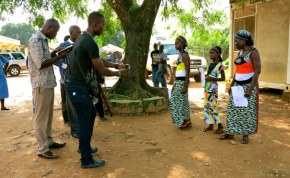 Washington, DC — Imagine this choice. Your child has Ebola symptoms. You have no protective gloves to help keep you alive to care for her. But she needs comfort, so you wash her and wipe away her vomit – and you both die.
Washington, DC — Imagine this choice. Your child has Ebola symptoms. You have no protective gloves to help keep you alive to care for her. But she needs comfort, so you wash her and wipe away her vomit – and you both die.
Liberia, one of the three most-affected countries, doesn't have enough gloves even for medical staff. Overwhelmed international caregivers – like the uniquely engaged Médecins Sans Frontières/Doctors Without Borders (MSF) – are expressing disbelief at the 'too little, too late' international response.
"We are completely amazed by the lack of willingness and professionalism and coordination to tackle this epidemic," the group's operations director, Brice de le Vingne, told the Financial Times, saying Liberia, where MSF is scaling up treatment centers, is a country on the verge of collapse. "We have been screaming for months," he said.
The group says there is nowhere near the assistance needed, despite recent efforts. Only after a traveler from Liberia took the virus to oil-rich Nigeria, Africa's most populous nation and host to large international investments and businesses, did the global response reach even the current modest levels.
The World Health Organization this month is launching a U.S. $100 million disaster plan, after exhausting previous contributions of $7 million. The U.S. Centers for Disease Control (CDC) has sent 19 people to work in Liberia, and Public Affairs Director Barbara Reynolds says at least 60 CDC people are in Liberia, Guinea and Sierra Leone, plus Nigeria.
Nobody who has been working on the Ebola crisis in Guinea, Sierra Leone or Liberia thinks that's close to what's needed.
Contrast that with the world response to the 2010 Haitian earthquake. Over $3.5 billion was donated by governments, organizations and individuals. Within 24 hours, the small nation of Israel had equipped a plane with emergency medical supplies, and 40 doctors and 20 nurses and 20 medics were able to set up a field hospital on arrival – including a patient identification system and electronic medical records. More than 300 CDC staff went to Haiti to assist in the recovery, including battling the ensuing cholera epidemic. In much of North America, Latin America and Europe, commercial businesses put out collection boxes for relief donations. Individuals responded massively.
Nothing like that is in place for west Africa.
"The virus has devastated the entire health infrastructure of the country," says Riva Levinson, whose Washington,DC-based KRL International works with the government of Liberia to get its message out. That means Liberians are dying in large numbers every day from easily treated but common diseases in one of the world's poorest countries routine gastrointestinal infections, pneumonia, complications of pregnancy, and malaria – which is at its highest levels in the current rainy season – due to the absence of care. [See AllAfrica's Bokai Fofana's blog about the heightened worry about finding treatment when his young son developed malaria.
Clinics and hospitals have closed, not only from losses of staff but from for lack of infection control supplies and disinfectant to make buildings and wards safe for caregivers or other patients following treatment of Ebola sufferers. That lack of capacity forced Dr. James Sirleaf, medical director of the medical assistance group Heartt Foundation, to pull its volunteers out of John F. Kennedy Hospital (JFK) in Monrovia, the country's main teaching and referral facility. "It was an agonizing decision," he said.
Heartt has formed ties with at least 19 major U.S. medical schools and universities and has a program that takes volunteers to JFK on short rotations to teach medical students and other health professionals while providing patient care. Last month the epidemic claimed JFK's top medical consultant, Dr. Samuel Brisbane.
Dozens of health workers have died, in a country that – before Ebola struck – only had around 50 doctors for a population of over four million. AllAfrica's Patience Dalieh's cousin, a nurse, died last week, after treating patients in a cross-roads market town of Kakata, in central Liberia; eleven other nurses in the facility died. (Patience didn't let fear stop her from trying to prevent Ebola's spread in Monrovia, Liberia's capital. See her blog.)
On Friday, in a rare bit of good news for Liberia, Dr. Phillip Ireland, who was treated at the same Ebola treatment center as Brisbane, walked out of the center, arms raised as he greeted family and supporters.
Heartt's Sirleaf first met Ireland when the then-medical student approached him for help in augmenting his emergency medicine skills. "When I heard he had contracted Ebola, I cried," says Sirleaf. "His recovery is wonderful news!"
But there is little good news for the country that already was struggling to recover from a quarter century of conflict that killed 250,000 people and dislocated three-quarters of the population, while destroying almost all the infrastructure – clinics, schools, roads, bridges and public buildings. The administration of President Ellen Johnson Sirleaf has been battling to rebuild, and there were clear signs of recovery against the odds. [See Briefing: Moving From Stabilization to Transformation] .Now, much of that hard-won progress has been erased – and is threatened with reversal. Schools have closed, Peace Corps teachers have left, companies working on critical development projects have withdrawn staff. The government announced that essential work on dams and roads has stopped.
source: http://allafrica.com/
